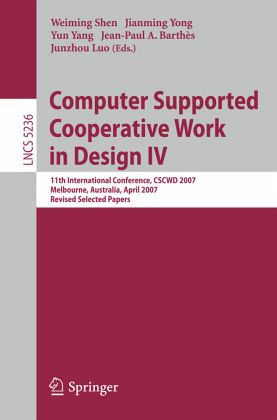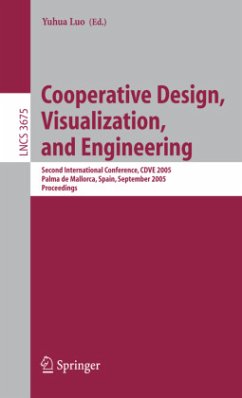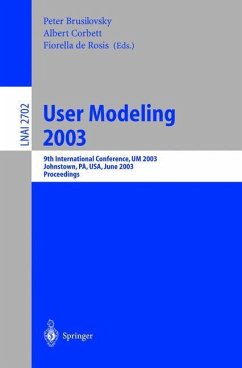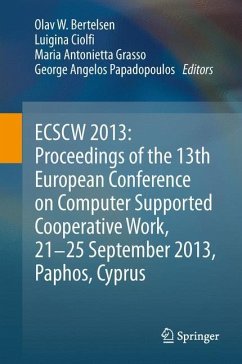
Computer Supported Cooperative Work in Design IV
11th International Conference, CSCWD 2007, Melbourne, Australia, April 26-28, 2007. Revised Selected Papers
Herausgegeben: Shen, Weiming; Yong, Jianming; Yang, Yun; Barthès, Jean-Paul A.; Luo, Junzhou

PAYBACK Punkte
39 °P sammeln!
This book constitutes the thoroughly refereed post-conference proceedings of the 11th International Conference on Computer Supported Cooperative Work in Design, CSCWD 2007, held in Melbourne, Australia, in April 2007.
This book, as the fourth volume of its series on Computer-Supported Cooperative Work in Design, includes 60 articles that are the expanded versions of the papers presented at CSCWD 2007. The book is organized in topical sections on CSCW techniques and methods, collaborative design, collaborative manufacturing and enterprise collaboration, agents and multi-agent systems, Web services, Semantic Web, and Grid computing, knowledge management, security, privacy, and trust in CSCW systems, workflow management, e-learning, and other applications.
This book, as the fourth volume of its series on Computer-Supported Cooperative Work in Design, includes 60 articles that are the expanded versions of the papers presented at CSCWD 2007. The book is organized in topical sections on CSCW techniques and methods, collaborative design, collaborative manufacturing and enterprise collaboration, agents and multi-agent systems, Web services, Semantic Web, and Grid computing, knowledge management, security, privacy, and trust in CSCW systems, workflow management, e-learning, and other applications.
Design of complex artifacts and systems requires the cooperation of multidisciplinary design teams using multiple sophisticated commercial and non-commercial engine- ing tools such as CAD tools, modeling, simulation and optimization software, en- neering databases, and knowledge-based systems. Individuals or individual groups of multidisciplinary design teams usually work in parallel and independently with various engineering tools, which are located on different sites, often for quite a long period of time. At any moment, individual members may be working on different versions of a design or viewing the design from various perspectives, at different levels of details. In order to meet these requirements, it is necessary to have efficient comput- supported collaborative design systems. These systems should not only automate in- vidual tasks, in the manner of traditional computer-aided engineering tools, but also enable individual members to share information, collaborate, and coordinate their activities within the context of a design project. Based on close international collaboration between the University of Technology of Compiègne in France and the Institute of Computing Technology of the Chinese Ac- emy of Sciences in the early 1990s, a series of international workshops on CSCW in Design started in 1996. In order to facilitate the organization of these workshops, an International Working Group on CSCW in Design (CSCWD) was established and an International Steering Committee was formed in 1998. The series was converted to int- national conferences in 2000 building on the success of the four previous workshops.














